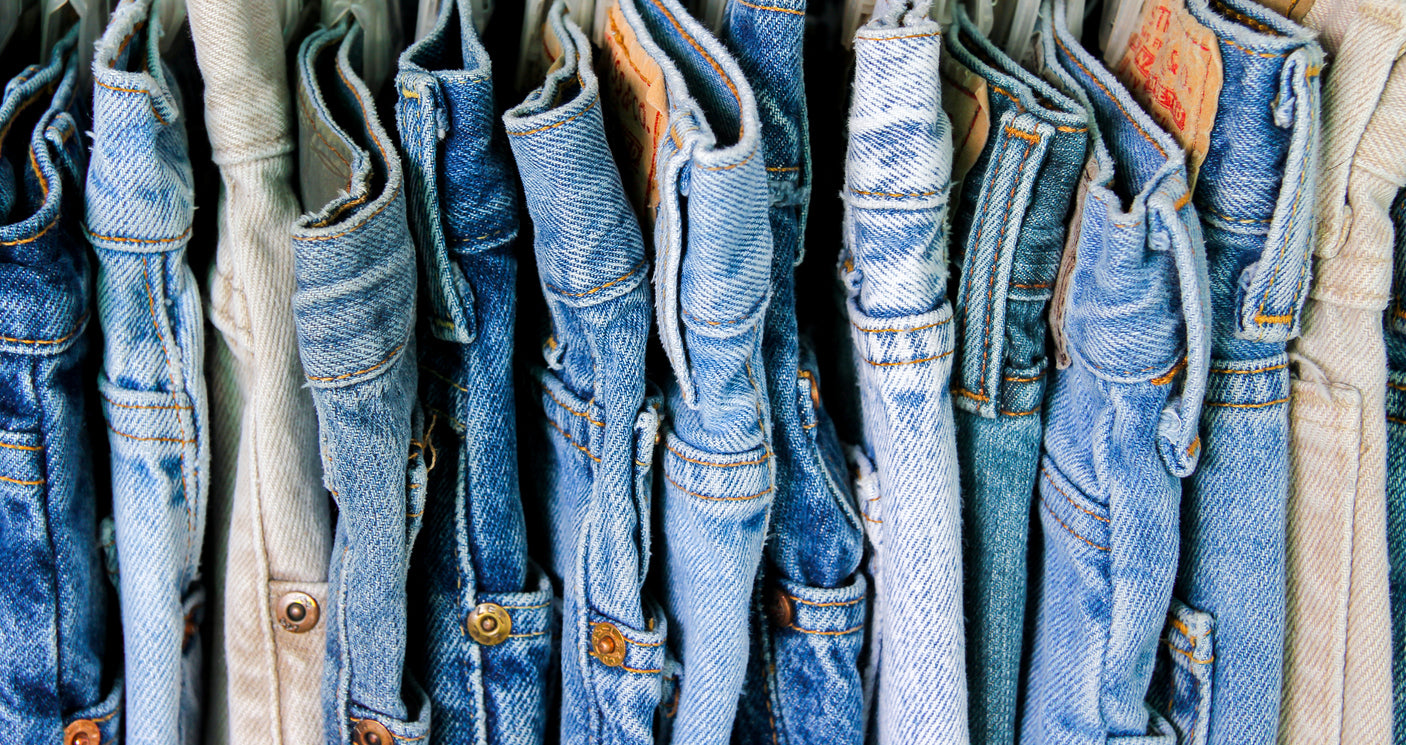Weird and Wonderful Facts About Denim Jeans You Probably Don’t Know
Holé jean button covers work brilliantly to protect your tops when placed over the button on your jeans (or any other trousers that have buttons), and in the past we’ve written about everything from sustainable denim to how to take care of denim. One day whilst idly researching, we came across some questions that people on the internet commonly ask about jeans, which lead us down a rabbit hole….
We popped out the other end armed with a variety of weird and wonderful facts about jeans that we thought would be fun to share with you, so here we go!

When were jeans invented?
Jeans were invented in May 1873 by Levi Strauss and Jacob Davis who obtained a patent for riveted men’s work trousers for the very first time.
Why do jeans seem to shrink in the wash?
The give of denim jeans is traditional quite low, these days many jeans will contain an element of Lycra or similar to give them a little bit of stretch, improving levels of comfort.
Denim will often come out of the washing machine and after drying can feel tighter. This happens because when denim fabric is exposed to heat the plant fibers constrict and shrink. The good news is, as long as you’ve followed the relevant care instructions, after wearing them for a short time they should loosen up and regain their true size.
Where jeans banned in Russia?
It’s a commonly held belief that denim jeans were at one time outlawed in the Soviet Union. During the Cold War, the Soviet government took an ideological stance on American fashion, viewing the western obsession with clothing and fashion as deviant and something to be stamped out. I
t was actually trade restrictions and the stance of the government that meant denim was less-frequently worn in the Soviet Union, but it was never explicitly banned.
Can tight jeans cause health problems?
Tight jeans can actually be bad for us, leading to or aggravating a range of health conditions from Cystitis to nerve damage. That’s because if your jeans are very tight, they can restrict blood and air flow.
Research has even found that tight jeans can impact male fertility and even something called “skinny ley syndrome” and so the advice is it’s OK to go skinny, but they need to feel comfortable and it’s best to make sure they aren’t too small and you should also make sure they’ve got a bit of stretch in them and that you aren’t wearing them all the time!

Why do jeans have rivets?
Jeans have rivets because they are located at points of strain that would commonly lead to trouser tearing over time. Rivets help strengthen key areas in jeans, like pocket corners at at the base of the button fly, making them stronger and more durable.
Denim was used for work trousers well before 1873, but it wasn’t until May 20th in that year that rivets were added, creating the denim trousers we now know as jeans.
What gives Denim its distinctive look?
The distinctive look and feel of Denim fabric is down to how it’s weaved with a specific composition of dyed cotton yarn (most often Indio coloured dye is yes) woven in warp-faced style.
How many pairs of jeans does the average person own?
The answer to how many pairs of jeans the average person owns differs depending on gender. Research cited by Fashion United found that women own an average of 7 pairs of jeans and that men own an average of 6 pairs of jeans.
Are jeans bad for the environment?
Traditionally the production of denim jeans has included multiple washes, dying that can cause run off as well as transportation of raw materials and finished products all of which have an environmental impact.
More manufacturers however are using more environmentally friendly processing and production methods leading in less water being used and the use of eco-friendly dyes, organic cotton and so on, all of which help to reduce the negative impact on the environment.
You can see our recommendations for the best sustainable denim jean brands here.

What’s the most popular denim colour?
Denim is probably the single most easily recognisable of fabrics and that’s not only down to the weave, but down to the characteristic colour. Indigo is still the most widespread denim colour, giving jeans that classic denim blue colour, but in the last couple of decades black jeans have surged in popularity.
Were blue jeans banned in America?
It’s true that during the 1950’s blue jeans were indeed banned in America in certain places like schools and restaurants. Jeans were seen as a garment worn by the rebellious, so the ban was intended to uphold a certain level of respectability.
Is it true you should rarely wash jeans?
We wrote a blog some time ago that answer the question of how often should I really wash my denim jeans, and revealed that the experts all agree, you should be washing your jeans less!
In fact, It’s recommended to only wash jeans when they are visibly dirty or smelly and it’s definitely not recommended to be washing them after every couple of wears.

